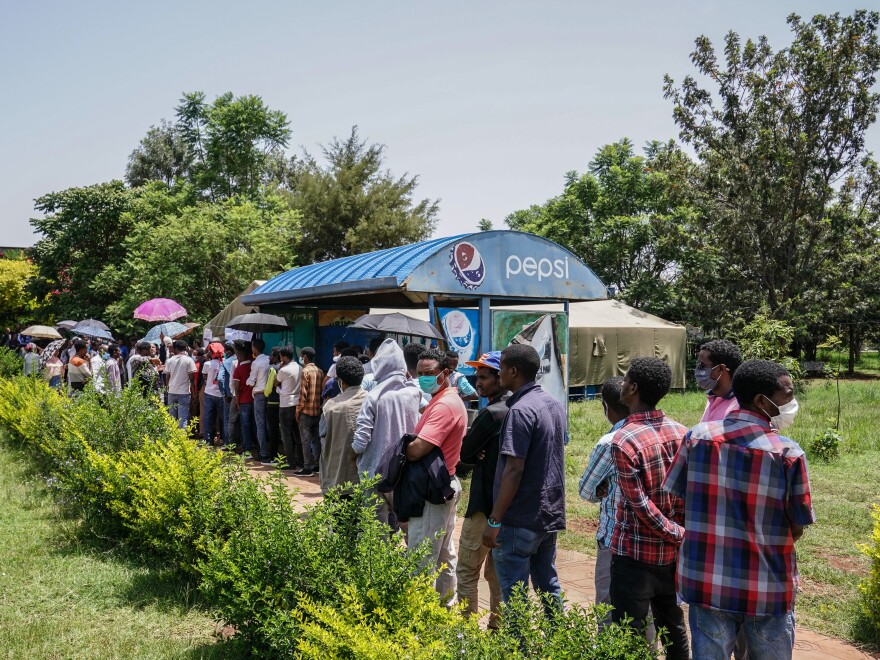Ethiopians are deciding Monday whether to return Prime Minister Abiy Ahmed to office as a growing conflict in Tigray has threatened to engulf the region, unraveling the international goodwill that helped win Abiy a Nobel Peace Prize just two years ago.
The vote, originally planned for last year but delayed by the pandemic, has been described by Abiy as the first attempt at free and fair elections in the country's history.
Speaking at a rally last week, Abiy told supporters of his Prosperity Party that Ethiopia would defy the dire forecasts predicting violence surrounding the polls. "When the entire world is saying we will fight on election day, we will instead teach them a lesson," he said.
Even so, Monday's vote got underway against a chaotic backdrop — with delays in some areas due to violence. In other places, delays were being attributed to other factors, including a boycott over allegations that the ruling Prosperity Party has engaged in harassment of its opposition members. The anti-Abiy parties in Oromia, Ethiopia's largest and most populous state, have decided to sit out the election. Tigray, which held elections last year in defiance of the federal government, will not be voting at all.
The country's election board chief, Birtukan Mideksa, said that most of the voting had been peaceful so far, but she expressed concern that opposition parties had complained about violence and intimidation in several regions, including in the state of Amhara, which borders Tigray.
"This will jeopardize the credibility of the election process and its result," Birtukan warned.
Election observers from the African Union and a number of Ethiopian groups were expected to monitor the balloting. Counting is expected to begin immediately after polls close on Monday, but results could take days.

Abiy is seen as having squandered a chance at peace
Even though Abiy is widely expected to be returned to power, he is seen at home and abroad as having squandered an opportunity at lasting regional peace by taking a heavy-handed approach against an insurrection in Tigray.
But more broadly, the conflict in Tigray and the atrocities committed there threaten to tear apart Ethiopia, said Alex de Waal, executive director of the World Peace Foundation and a research professor at the Fletcher School at Tufts University.
"Ethiopians are going to the polls under a cloud of doubt as to whether their country can even exist as a single entity in the near future," he wrote in an email to NPR. "In just the last few days, the Tigrayan resistance forces have inflicted heavy defeats on the Ethiopian army, exposing as false [Abiy's] claim to be within sight of a military victory."
Soon after taking office in 2018, Abiy made an overture to Isaias Afwerki, the president of longtime rival Eritrea, which won a brutal and protracted independence struggle from Ethiopia in 1991. The two leaders forged a historic peace accord aimed at resolving their differences – a move that garnered accolades in the international community.
But the conflict in Tigray – a region that straddles the border region between Ethiopia and Eritrea — quickly eclipsed his early peacemaking efforts.
Tigray is home to most of the country's estimated 7 million ethnic Tigrayans. The ethnic group accounts for about 6% of Ethiopia's population. In November, its regional government — controlled by the Tigray People's Liberation Front, a leftist political party — launched a siege against a key Ethiopian military base in the region, using tanks, heavy guns and mortars. In response, Abiy ordered a federal offensive.
The U.S. has sanctioned Ethiopia for the violence in Tigray
The U.S. has imposed sanctions on both Ethiopia and Eritrea, whose troops are also believed involved in a supporting role in Tigray. In May, the U.S. State Department pointed to "many credible reports of armed forces in Tigray committing acts of violence against civilians, including gender-based violence and other human rights abuses and atrocities."
Desalgn Shume, a voter in the capital, Addis Ababa, speaking to The Associated Press, said Ethiopians "need a government that brings us peace, unity and that will stop the killing everywhere, and we also need to be pulled out from these ethnic divisions."
As balloting began, U.N. human rights chief Michelle Bachelet said she was "deeply disturbed" by reports coming out of Tigray of executions of civilians, sexual violence against children and forced displacement.
"The ongoing deployment of military forces is not a durable solution, and I encourage comprehensive and multidimensional dialog throughout the country to address the real grievances held," she added.
The Prosperity Party is seen as the front-runner, and the election is expected to solidify Abiy's position. In addition to the violence and boycotts, the regional nature of the anti-Abiy opposition is likely to erode its chances at the polls further.
Many will consider the results illegitimate
Whether the results are viewed as legitimate depends a lot on what region of the country is concerned, said Tobias Hagmann, an expert on Ethiopia at Denmark's Roskilde University.
The election contest — and who contests the elections — matters in places such as the Addis Ababa and the Amhara regions.
However, "Tigrayans, most Oromo and many others (in other regions) will see the elections as flawed, as yet another ritualistic exercise by which the ruling party wins," Hagmann wrote in an email to NPR.
De Waal said much of the electorate is deeply disappointed with the country's prospects.
"Many of the most popular leaders – including those who led the democracy protests a few years ago – are in prison or are silenced; key parties are banned; the press is censored; and state media is filled with vitriolic condemnations of traitors and terrorists – categories that appear to include all ethnic Tigrayans and many, many others," he said.
Copyright 2021 NPR. To see more, visit https://www.npr.org.


